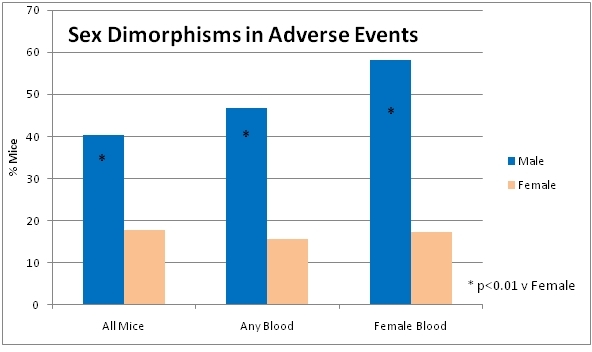Male Sex Predicts Adverse Events and Decreased Survival in Murine Pancreatic Adenocarcinoma
Douglas Benson*1,2, Angela Sauaia1, Christopher Silliman1,3, Peter K. Moore1, Marguerite Kelher1,3, Carlton C. Barnett1,2
1Surgery, University of Colorado at Denver HSC, Aurora, CO; 2Surgery, Denver Health Medical Center, Denver, CO; 3Bonfils Blood Center, Denver, CO
Introduction
Males with pancreatic cancer have been shown to have more adverse events and decreased survival compared to females. Moreover, perioperative blood transfusion appears to be linked to decreased survival in patients with pancreatic cancer. Our lab has demonstrated, using an immunocompetent murine model of pancreatic cancer, male mice have more metastatic events than female, which is accentuated by receipt of blood product from female donors. Using this model, we hypothesize male mice have more adverse events and decreased survival, which is worsened by blood transfusion.
Methods
133 C57/BL6 mice, age 8-9 weeks, underwent splenic inoculation of 2.5x10^5 PanO2 murine pancreatic adenocarcinoma cells. 58% were male. 80% were transfused at day 7 with 1ml/kg supernatant from day-42 red cells from male (50%) or female donors (50%), while control mice received saline. Mice were followed clinically and weighed three times per week with planned necropsy at 5 weeks, gross metastatic events were recorded. Adverse events were determined as >5 metastases, presence of bowel obstruction, or death prior to study endpoint. Survival analysis was performed using Kaplan-Meier and logistic regression used to evaluate the interaction between mouse sex and transfusion.
Results
Using Kaplan Meier analysis, male sex strongly correlated with decreased survival (p<0.001). All males had more metastatic events compared to females, 4.15±0.29 vs. 2.58±0.28 (p=0.0002), and adverse events, 40.3% vs. 17.9% (p=0.0057). Adverse events were increased in transfused males, 46.8% vs. 15.6% (p=0.0007), and this difference was exaggerated with receipt of female blood, 58.1% vs. 17.4% (p=0.003). Moreover, transfused male mice had reduced weight gain from baseline compared to saline control, 3.88%±0.97 vs. 6.78%±0.58 (p=0.03), this association was not seen in females.
Conclusion
Collectively, our analysis suggests that male sex modifies survival and the association of blood transfusions and blood donor gender on adverse events in pancreas cancer. These data demonstrate sex dimorphism that might influence treatment options in patients. Further study to delineate the mechanism of these findings is warranted.
Back to 2011 Program



